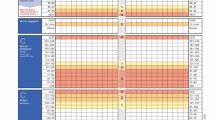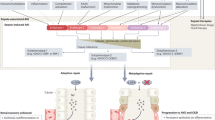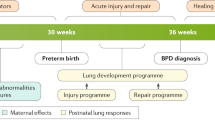Abstract
Background
Recent evidence demonstrates that earlier feeding may be beneficial after non-surgical necrotizing enterocolitis (NEC). We aimed to decrease time to reach full enteral feeds by 20% post-NEC by standardizing time to reinitiate feeds.
Methods
We implemented a consensus-based guideline for earlier feeding post-NEC. Outcome measures included days to initiate enteral feeds and reach full enteral feeds. Central venous line days and length of stay were also evaluated. Balancing measures were NEC recurrence and post-NEC stricture. Statistical analysis used process control methodology and standard comparison statistical testing.
Results
Average days infants with Stage II NEC began feeding decreased from 9.4 to 5.1 days and average days to reach full feeds was decreased by 35% from 24.0 to 15.7 days. We observed no change in our balancing measures.
Conclusion
A multidisciplinary consensus-based NEC earlier feeding guideline decreased time to reach full enteral feeds and reduced central line days without adverse events.
This is a preview of subscription content, access via your institution
Access options
Subscribe to this journal
Receive 12 print issues and online access
$259.00 per year
only $21.58 per issue
Buy this article
- Purchase on Springer Link
- Instant access to full article PDF
Prices may be subject to local taxes which are calculated during checkout


Similar content being viewed by others
References
Battersby C, Santhalingam T, Costeloe K, Modi N. Incidence of neonatal necrotising enterocolitis in high-income countries: a systematic review. Arch Dis Child Fetal Neonatal Ed. 2018;103:f182–189.
Dimmitt RA, Moss RL. Clinical management of necrotizing enterocolitis. NeoReviews. 2001;2:e110–e117.
Gregory KE, Deforge CE, Natale KM, Phillips M, Van Marter LJ. Necrotizing enterocolitis in the premature infant: neonatal nursing assessment, disease pathogenesis, and clinical presentation. Adv Neonatal Care. 2011;11:155–64.
King C Enteral feeding. In: Jones EaK, Caroline, editor. Feeding and nutrition in the preterm infant. Elsevier: Philadelphia, PA, 2005.
Niinikoski H, Stoll B, Guan X, Kansagra K, Lambert BD, Stephens J, et al. Onset of small intestinal atrophy is associated with reduced intestinal blood flow in TPN-fed neonatal piglets. J Nutr. 2004;134:1467–74.
Embleton ND, Zalewski SP. How to feed a baby recovering from necrotising enterocolitis when maternal milk is not available. Arch Dis Child Fetal Neonatal Ed. 2017;102:543–546.
Moss RL, Kalish LA, Duggan C, Johnston P, Brandt ML, Dunn JC, et al. Clinical parameters do not adequately predict outcome in necrotizing enterocolitis: a multi-institutional study. J Perinatol. 2008;28:665–74.
Arbra CA, Oprisan A, Wilson DA, Ryan RM, Lesher AP. Time to reintroduction of feeding in infants with nonsurgical necrotizing enterocolitis. J Pediatr Surg. 2018;53:1187–91.
Bohnhorst B, Müller S, Dördelmann M, Peter CS, Petersen C, Poets CF. Early feeding after necrotizing enterocolitis in preterm infants. J Pediatr. 2003;143:484–487.
Brotschi B, Baenziger O, Frey B, Bucher HU, Ersch J. Early enteral feeding in conservatively managed stage II necrotizing enterocolitis is associated with a reduced risk of catheter-related sepsis. J Perinat Med. 2009;37:701–705.
Patel EU, Wilson DA, Brennan EA, Lesher AP, Ryan RM. Earlier re-initiation of enteral feeding after necrotizing enterocolitis decreases recurrence or stricture: a systematic review and meta-analysis. J Perinatol. 2020;40:1679–87.
Walsh MC, Kliegman RM. Necrotizing enterocolitis: treatment based on staging criteria. Pediatr Clin North Am. 1986;33:179–201.
Provost LP, Murray S The health care data guide: learning from data for improvement. Jossey-Bass: San Francisco, CA, 2011.
Gupta M, Kaplan HC. Using statistical process control to drive improvement in neonatal care: a practical introduction to control charts. Clin Perinatol. 2017;44:627–44.
Montgomery D Introduction to statistical quality control, 4th edn. John Wiley & Sons, 2001.
Goodman D, Ogrinc G, Davies L, Baker GR, Barnsteiner J, Foster TC, et al. Explanation and elaboration of the SQUIRE (Standards for Quality Improvement Reporting Excellence) Guidelines, V.2.0: examples of SQUIRE elements in the healthcare improvement literature. BMJ Qual Saf. 2016;25:e7.
Massoud MR, Nielsen GA, Nolan K, Schall MW, Sevin C A Framework for Spread: From Local Improvements to System-Wide Change. IHI Innovation Series white paper 2006.
Mowitz ME, Dukhovny D, Zupancic JAF. The cost of necrotizing enterocolitis in premature infants. Semin Fetal Neonatal Med. 2018;23:416–419.
Johnson TJ, Patel AL, Jegier BJ, Engstrom JL, Meier PP. Cost of morbidities in very low birth weight infants. J Pediatr. 2013;162:243–249.e241.
Bakhuizen SE, de Haan TR, Teune MJ, van Wassenaer-Leemhuis AG, van der Heyden JL, van der Ham DP, et al. Meta-analysis shows that infants who have suffered neonatal sepsis face an increased risk of mortality and severe complications. Acta Paediatr. 2014;103:1211–1218.
Jasani B, Patole S. Standardized feeding regimen for reducing necrotizing enterocolitis in preterm infants: an updated systematic review. J Perinatol. 2017;37:827–33.
Alshaikh B, Kostecky L, Blachly N, Yee W. Effect of a quality improvement project to use exclusive mother’s own milk on rate of necrotizing enterocolitis in preterm infants. Breastfeed Med. 2015;10:355–61.
Hamilton E, Massey C, Ross J, Taylor S. Early enteral feeding in very low birth weight infants. Early Hum Dev. 2014;90:227–30.
Gephart SM, Underwood MA, Rosito S, Kim JH, Caplan MS. Grading the evidence to identify strategies to modify risk for necrotizing enterocolitis. Pediatr Res. 2020;88:41–47.
Talavera MM, Bixler G, Cozzi C, Dail J, Miller RR, McClead R, et al. Quality improvement initiative to reduce the necrotizing enterocolitis rate in premature infants. Pediatrics. 2016;137:e20151119.
Rolnitsky A, Ng E, Asztalos E, Sharma Y, Karol D, Findlater C, et al. A quality improvement intervention to reduce necrotizing enterocolitis in premature infants with probiotic supplementation. Pediatr Qual Saf. 2019;4:e201.
Author information
Authors and Affiliations
Contributions
EUP conducted a literature search, helped with the study design, performed the data collection, contributed to the data analysis and data interpretation, helped write the manuscript, and performed critical revisions. WTH conducted a literature search, helped write the manuscript, and performed critical revisions. AR helped with the study design, contributed to the data analysis and interpretation, and performed critical revisions. RMR helped with the study design, contributed to the data analysis and interpretation, and performed critical revisions. APL helped with the study design, contributed to the data analysis and interpretation, and performed critical revisions.
Corresponding author
Ethics declarations
Competing interests
The authors declare no competing interests.
Additional information
Publisher’s note Springer Nature remains neutral with regard to jurisdictional claims in published maps and institutional affiliations.
Supplementary information
Rights and permissions
About this article
Cite this article
Patel, E.U., Head, W.T., Rohrer, A. et al. A quality improvement initiative to standardize time to initiation of enteral feeds after non-surgical necrotizing enterocolitis using a consensus-based guideline. J Perinatol 42, 522–527 (2022). https://doi.org/10.1038/s41372-022-01324-6
Received:
Revised:
Accepted:
Published:
Issue Date:
DOI: https://doi.org/10.1038/s41372-022-01324-6



